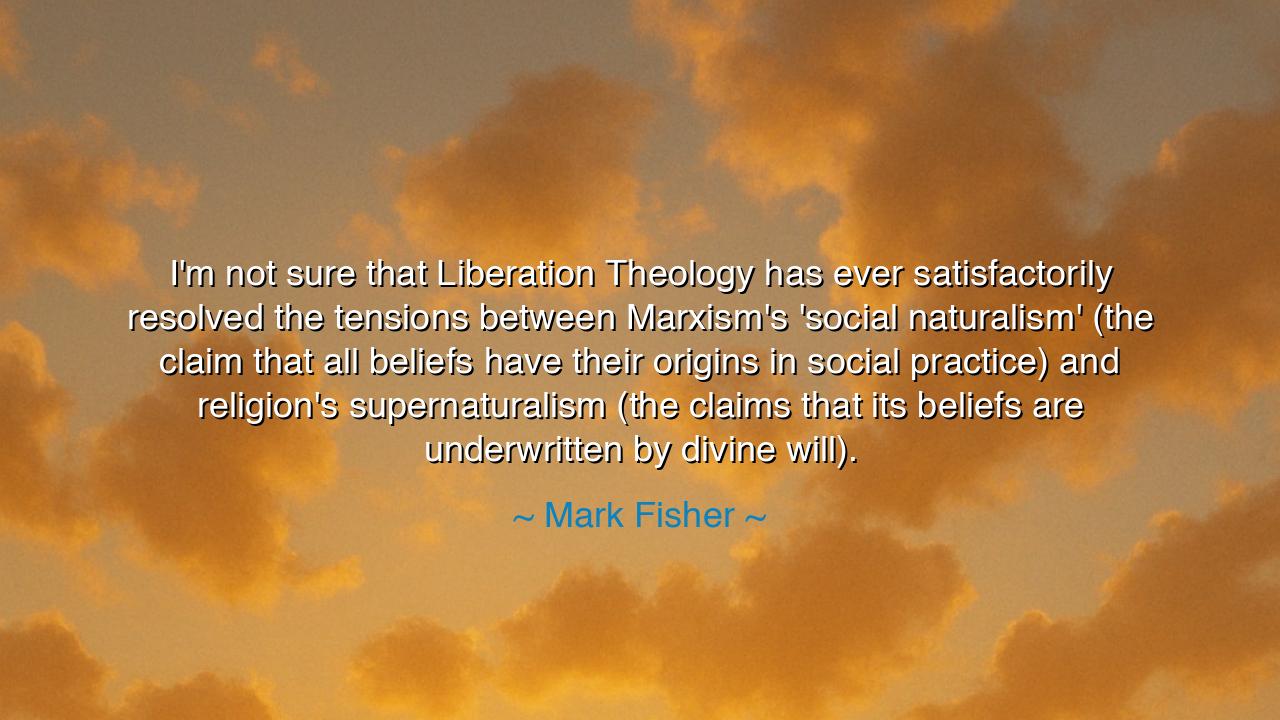
I'm not sure that Liberation Theology has ever satisfactorily
I'm not sure that Liberation Theology has ever satisfactorily resolved the tensions between Marxism's 'social naturalism' (the claim that all beliefs have their origins in social practice) and religion's supernaturalism (the claims that its beliefs are underwritten by divine will).






Liberation Theology, a powerful force that arose amidst the struggles of the oppressed, sought to reconcile the timeless pursuit of justice with the profound teachings of faith. It is an ideology born of the cries of the poor, of the anguished voices that echoed in the streets of Latin America, calling for not only spiritual salvation, but for social liberation. Yet, in its quest to bridge the realms of faith and social justice, it has found itself entangled in a paradox that still lingers in the minds of many. Mark Fisher encapsulates this dilemma with his thoughtful observation that Liberation Theology struggles to resolve the tension between Marxism's social naturalism—the belief that all human thought and belief arise from the material conditions of society—and the supernaturalism of religion, which claims that beliefs are not rooted in earthly existence, but in the divine will of a higher power.
At the heart of this tension lies a question as old as humanity itself: is the human condition shaped solely by material, earthly forces, as Marx would argue, or is it guided by a divine and transcendent will, as religious traditions maintain? Marxism, in its focus on the material world, insists that our beliefs—our ideas of morality, justice, and even religion—are the product of our social practice, shaped by the economic and political structures of the time. The social naturalism of Marxism suggests that the ideas of the masses are determined by their material circumstances, that their thoughts are not free, but are conditioned by the world around them. In this view, religion is seen as a tool of the oppressor, a mechanism that serves to pacify the masses and distract them from their material struggles.
On the other hand, religion—especially in its more orthodox forms—asserts that its beliefs come not from human consciousness, but from the divine. These beliefs are considered universal truths, eternal and absolute, unaffected by the changing tides of history. Religion's supernaturalism argues that humanity’s deepest moral truths, its sense of right and wrong, its understanding of justice and love, are dictated by divine authority and not by any earthly conditions. This is where the tension lies: can a divine will and a materialist understanding of society coexist in a single framework? Can faith that originates in the divine be reconciled with the Marxist view that all human belief stems from social relations?
Consider the historical context of Liberation Theology itself—born out of the Catholic Church's response to the oppression of the poor in Latin America. The theology sought to unite the Christian belief in salvation with the Marxist call for social justice, urging the faithful to see their struggles as part of a divine mission to liberate the oppressed. It sought to provide both spiritual hope and political action, claiming that liberation was not just a political act, but a divine imperative. Yet, in attempting to merge these two seemingly incompatible worldviews—Marxist materialism and Christian supernaturalism—it ran into the philosophical tension that Fisher so astutely identifies. Can social justice be reduced to mere material conditions, or is it something higher, something that exists beyond the reach of human understanding?
Fisher's critique speaks to a larger problem that has plagued many revolutionary movements throughout history: the difficulty of reconciling idealism with materialism, spirituality with pragmatism. For while the oppressed often find solace in the belief that their suffering is part of a greater divine plan, it is also true that material conditions—poverty, inequality, and injustice—are at the heart of their struggles. Is it possible, then, to believe that social change can be both a human project grounded in earthly realities, as Marxism would have it, and a divine calling, as Liberation Theology proposes? This question remains unanswered, as faith and materialism continue to pull in opposite directions.
The lesson of Fisher’s reflection is profound. It reminds us that when we seek justice, we must consider both the material and the spiritual dimensions of the struggle. It calls us to question where we place our faith—in the world we can see and touch, or in the divine that transcends our understanding. Perhaps the true task of the revolutionary is to honor both the material conditions that shape human lives and the spiritual values that inspire the fight for a better world. We must, as the ancient sages have always taught, seek the balance between the earthly and the divine, recognizing that neither can exist in isolation, but must work together to guide humanity toward true liberation.
To navigate the tensions of our time, we must not reject either the material or the spiritual. Instead, we must learn to live within the tension, to hold both perspectives in our hearts, and to strive for a world where the material and the divine can coexist. The pursuit of justice, both social and spiritual, requires that we do not simply accept the world as it is, but transform it through our actions and beliefs. Thus, we must walk the path of discovery—understanding the forces of social practice while also honoring the higher divine will that calls us to a more just and equitable world.






AAdministratorAdministrator
Welcome, honored guests. Please leave a comment, we will respond soon